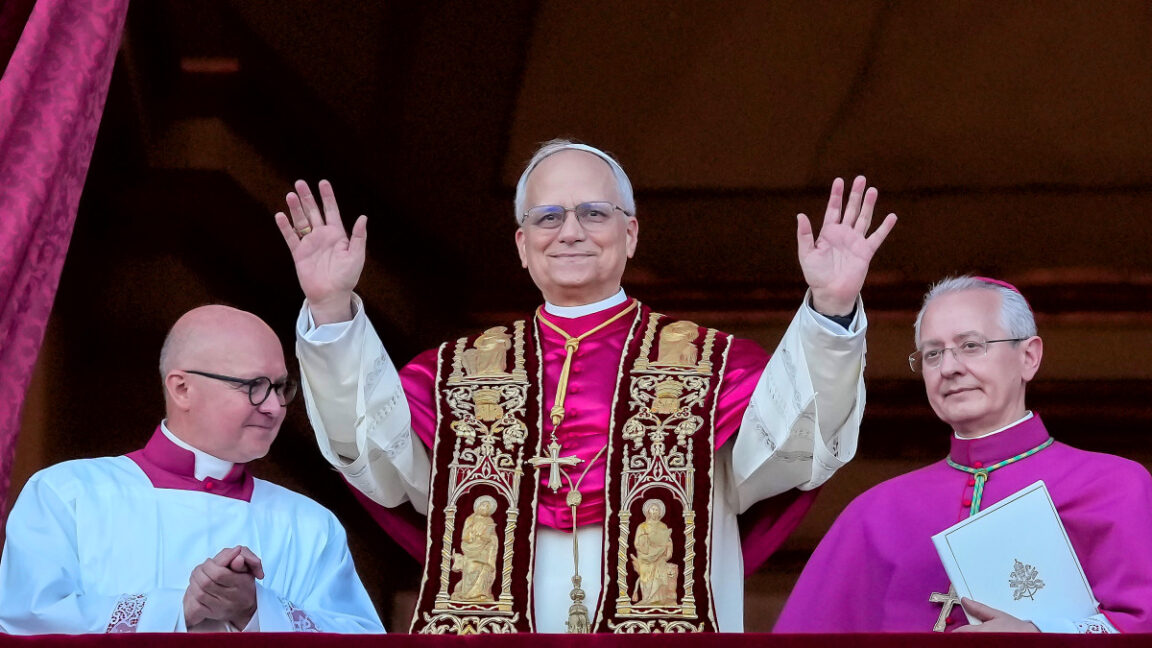ARSTECHNICA.COM
New pope chose his name based on AI’s threats to “human dignity”
deus ex machina
New pope chose his name based on AI’s threats to “human dignity”
Pope Leo XIV warns AI could threaten workers as industrial revolution did in the 1800s.
Benj Edwards
–
May 12, 2025 1:04 pm
|
35
The newly elected Pontiff, Pope Leo XIV is seen for the first time from the Vatican balcony on May 8, 2025 in Vatican City, Vatican.
Credit:
Christopher Furlong via Getty Images
The newly elected Pontiff, Pope Leo XIV is seen for the first time from the Vatican balcony on May 8, 2025 in Vatican City, Vatican.
Credit:
Christopher Furlong via Getty Images
Story text
Size
Small
Standard
Large
Width
*
Standard
Wide
Links
Standard
Orange
* Subscribers only
Learn more
Last Thursday, white smoke emerged from a chimney at the Sistine Chapel, signaling that cardinals had elected a new pope. That's a rare event in itself, but one of the many unprecedented aspects of the election of Chicago-born Robert Prevost as Pope Leo XIV is one of the main reasons he chose his papal name: artificial intelligence.
On Saturday, the new pope gave his first address to the College of Cardinals, explaining his name choice as a continuation of Pope Francis' concerns about technological transformation.
"Sensing myself called to continue in this same path, I chose to take the name Leo XIV," he said during the address. "There are different reasons for this, but mainly because Pope Leo XIII in his historic Encyclical Rerum Novarum addressed the social question in the context of the first great industrial revolution."
In his address, Leo XIV explicitly described "artificial intelligence" developments as "another industrial revolution," positioning himself to address this technological shift as his namesake had done over a century ago.
As the head of an ancient religious organization that spans millennia, the pope's talk about AI creates a somewhat head-spinning juxtaposition, but Leo XIV isn't the first pope to focus on defending human dignity in the age of AI.
Pope Francis, who died in April, first established AI as a Vatican priority, as we reported in August 2023 when he warned during his 2023 World Day of Peace message that AI should not allow "violence and discrimination to take root." In January of this year, Francis further elaborated on his warnings about AI with reference to a "shadow of evil" that potentially looms over the field in a document called "Antiqua et Nova" (meaning "the old and the new").
"Like any product of human creativity, AI can be directed toward positive or negative ends," Francis said in January. "When used in ways that respect human dignity and promote the well-being of individuals and communities, it can contribute positively to the human vocation. Yet, as in all areas where humans are called to make decisions, the shadow of evil also looms here. Where human freedom allows for the possibility of choosing what is wrong, the moral evaluation of this technology will need to take into account how it is directed and used."
History repeats with new technology
While Pope Francis led the call for respecting human dignity in the face of AI, it's worth looking a little deeper into the historical inspiration for Leo XIV's name choice.
In the 1891 encyclical Rerum Novarum, the earlier Leo XIII directly confronted the labor upheaval of the Industrial Revolution, which generated unprecedented wealth and productive capacity but came with severe human costs. At the time, factory conditions had created what the pope called "the misery and wretchedness pressing so unjustly on the majority of the working class." Workers faced 16-hour days, child labor, dangerous machinery, and wages that barely sustained life.
The 1891 encyclical rejected both unchecked capitalism and socialism, instead proposing Catholic social doctrine that defended workers' rights to form unions, earn living wages, and rest on Sundays. Leo XIII argued that labor possessed inherent dignity and that employers held moral obligations to their workers. The document shaped modern Catholic social teaching and influenced labor movements worldwide, establishing the church as an advocate for workers caught between industrial capital and revolutionary socialism.
Just as mechanization disrupted traditional labor in the 1890s, artificial intelligence now potentially threatens employment patterns and human dignity in ways that Pope Leo XIV believes demand similar moral leadership from the church.
"In our own day," Leo XIV concluded in his formal address on Saturday, "the Church offers to everyone the treasury of her social teaching in response to another industrial revolution and to developments in the field of artificial intelligence that pose new challenges for the defense of human dignity, justice, and labor."
Benj Edwards
Senior AI Reporter
Benj Edwards
Senior AI Reporter
Benj Edwards is Ars Technica's Senior AI Reporter and founder of the site's dedicated AI beat in 2022. He's also a tech historian with almost two decades of experience. In his free time, he writes and records music, collects vintage computers, and enjoys nature. He lives in Raleigh, NC.
35 Comments
